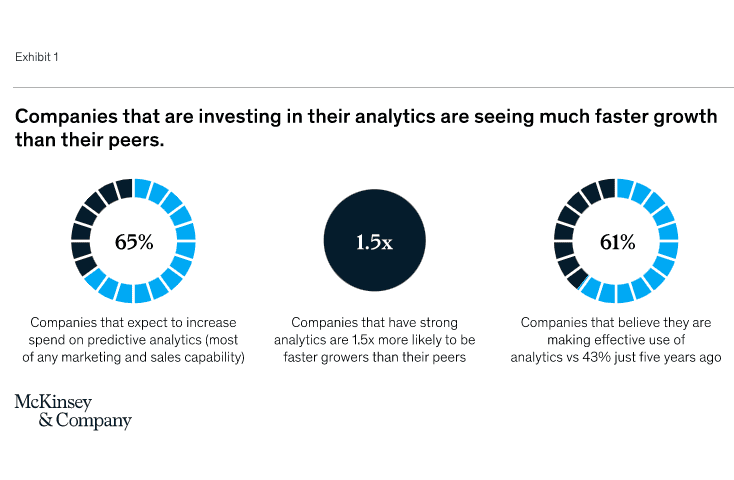Adoption of data analytics is a must for FMCG brands who want to drive consistent, outsized growth. Research shows that FMCG brands who effectively use data analytics capabilities to service their sales and marketing processes are 150 percent more likely to outgrow their competitors. Many FMCG leaders, especially those in emerging markets, recognize the need to leverage data to grow their businesses, as 64 percent of leaders expect to increase their spending on predictive analytics.

However, many brands do not effectively use data to drive the needed growth. Studies show that only 40 percent of consumer-goods companies have achieved returns above the cost of their investments into data analytics. To increase sales, achieve outsized growth, and outperform the competition, companies must learn to use data analytics to engage prospects better and increase the lifetime value of the average customer.
Why FMCG brands fail to drive growth with data analytics
The value at stake for FMCG brands that do not effectively utilize data analytics is enormous. Industry trends show that a brand’s ability to scale up its data analytics capabilities strongly correlates with its financial performance. The companies with the highest level of analytics maturity are creating significant value and have a growth rate of approximately 60 percent more than their competitors.
We have worked extensively with FMCG brands in emerging markets and have identified some of the most common pitfalls that prevent companies from capturing value at scale from data analytics:
- Failure to set specific goals for data analytics programs: Companies who fail to drive consistent growth with data analytics are often guilty of not setting clear goals for their analytics programs, such as increasing cross-sells, increasing sales velocity, or reducing churn. They treat analytics as side projects rather than critical enablers of company-wide growth objectives. Unfortunately, this means that digitalization efforts struggle to get the attention and resources needed to succeed.
- Failure to capture valuable data: Many FMCGs capture or purchase large volumes of data in the hope of unlocking value but lack the capabilities to translate the available data to relevant and usable insights. Without the ability to properly analyze data, extract insights, and make data-driven decisions that provide a deeper understanding of the customers’ needs and enable a more efficient sales process, any investment into data analytics will not produce the expected growth.
- Failure to invest in change management: Senior leaders must model the change of making data-driven decisions and provide a comprehensive plan to encourage adoption by frontline employees. Without adequate investment in change management, the proposed data-driven changes made to sales and marketing processes will face low adoption.
How FMCG brands can use data analytics effectively
Many FMCG brands have been unable to leverage data-driven growth at scale, but the recipe for success is clear. To successfully drive growth with data analytics, FMCG brands must:
- Agree on the most important goals: To avoid wasting resources on programs that do not deliver significant value, senior leaders in the company must agree on what analytics goals to pursue. Leaders and their teams must collaborate to identify the greatest value, then shift resources and focus on those areas.
For most FMCG brands in emerging markets, the greatest value lies in gaining visibility across the entire distribution chain. The traditional distribution chains are ‘dark’ and provide no visibility at point of sale. Providing insights into these ‘dark markets’ is crucial to identifying and maximizing growth opportunities. - Select the tools and solutions that generate the best insights: The quality of insights generated by an analytics solution will significantly impact the level of growth unlocked. Thus, FMCG brands must invest in tools that capture the right type of data and analyze it to provide actionable insights. Furthermore, the tool must make the insights available in an easy-to-understand format so that leaders can make data-driven decisions in real-time.
- Invest in change management: Ultimately, the success or failure of an analytics program depends on the level of acceptance and adoption by the frontline sales teams. If sales reps are not involved in the development or selection of analytics tools, they are less likely to trust the tool and might abandon it outrightly. Leaders must educate frontline sales and marketing teams on the need for an analytics solution and communicate in clear terms how the insights generated can help improve their performance.
Unlock consistent growth with RedCloud
RedCloud has built the world’s first open commerce platform, a complete data analytics solution that unlocks growth for FMCG brands in emerging markets. Our solution provides brands with real-time visibility into the distribution chain and provides actionable insights that can be leveraged to make data-driven decisions that drive growth.
With RedCloud, sales and marketing teams can see in real-time who their customers are, what products they are buying, and how often they buy. With these granular insights, you can design targeted trade promotions and growth marketing campaigns that increase order velocity and ultimately lead to more sales.
We have also built the world’s largest payment platform with over 1 million pay-in points in 200 countries. Now, brands can easily accept digital payments from their customers and avoid huge cash handling costs. By trading on a digital platform and building a trading profile, brands can identify fast-growing merchants and provide them with advanced supply-chain financing to help them grow their business, even if the merchant does not have a bank account.
Schedule a demo with us today to discover how RedCloud can help you outperform the competition and drive sustainable growth.




You must be logged in to post a comment.